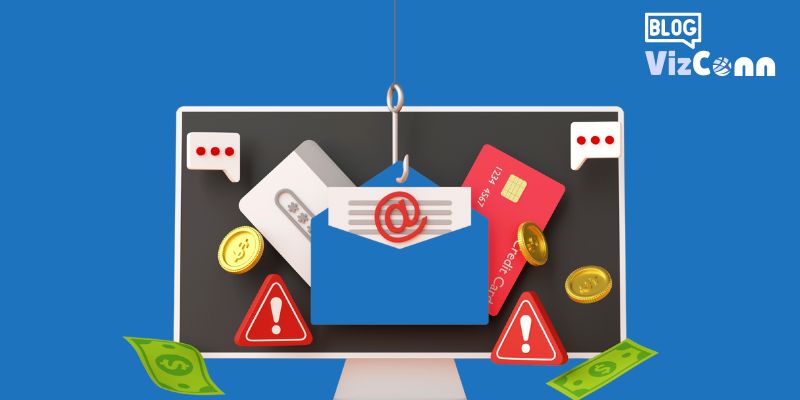

In today's digital age, email has become an indispensable tool for communication in both personal and professional spheres. However, with the rise of cybercrime, it's crucial for organizations and employees to remain vigilant against email-related scams that can compromise sensitive information and financial security.
There are several common email scams that cybercriminals use to deceive individuals and organizations. Some of the most prevalent email scams include:
Phishing Scams: Phishing scams are cunning attempts by cybercriminals to deceive individuals into revealing sensitive information or performing harmful actions. These
fraudulent emails often masquerade as trustworthy sources, such as banks or government agencies, and employ tactics like urgency or fear to coerce recipients into clicking on malicious
links or sharing personal details. These links typically lead to fake websites that closely resemble legitimate ones, making it challenging to discern the scam. Stay vigilant and cautious
when encountering unexpected emails requesting sensitive information or urgent actions to avoid falling victim to these scams.
Here is an example:
Dear [Recipient's Name],
We regret to inform you that there has been suspicious activity detected on your account. In order to secure your account and prevent unauthorized access, we kindly request your immediate action.
Please click on the following link to verify your account details and reset your password: [Fake Link]
Failure to complete this process within 24 hours may result in the temporary suspension of your account. Thank you for your cooperation.
Best Regards,
[Impersonated Company Name]
Business Email Compromise (BEC): BEC scams target businesses by impersonating executives or employees to deceive recipients into making unauthorized payments or divulging sensitive
company information. These scams often involve sophisticated social engineering tactics and can result in significant financial losses. Often, scammers make use of employee directories to
find the names of managers and impersonate them in the fake emails sent to their subordinates. A common exmaple is a scammer impersonating a Chief Executive Officer in an email to a
HR Manager.
Here is an example:
Dear [Recipient's Name],
I hope this email finds you well. I'm currently traveling and unable to process payments via our regular channels. As such, I kindly request your assistance in processing an urgent invoice payment to our vendor, [Fake Vendor Name].
Attached is the invoice for your reference. Please make the payment as soon as possible and notify me once it's done so I can update our records accordingly. Thank you for your prompt attention to this matter.
Best Regards,
[Impersonated Sender's Name]
[Impersonated Sender's Position]
[Impersonated Company Name]
Fake Invoice Scams: In this type of scam, cybercriminals send fake invoices or payment requests to individuals or businesses, often posing as suppliers or service providers. The
goal is to trick recipients into making payments for goods or services that were never provided, resulting in financial loss.
Lottery or Prize Scams: These scams promise recipients a large sum of money or valuable prizes in exchange for personal information or payment of fees. Victims are typically
instructed to provide bank account details or pay upfront costs to claim their supposed winnings, only to discover that there is no prize and they have been defrauded.
Employment Scams: Fraudulent job offers sent via email may promise lucrative employment opportunities or work-from-home positions in exchange for upfront fees or personal
information. These scams often target job seekers looking for employment opportunities and can result in financial loss or identity theft.
Domain/Trademark Scam (China):
In this scam, the fraudulent entity aims to create a sense of urgency and concern by alleging that another company is attempting to register domain names similar to yours in China.
The scammer may claim to be a legitimate domain registration agency or registrar, but their primary goal is to deceive recipients into
purchasing unnecessary domain names at inflated prices.
Here is an example:
"Dear Sir or Madam,
This is a letter regarding the authorization of domain and brand names of your company, please take it seriously. We are a Chinese registrar for domain and brand names. The registration request has been received by our company from SIQL Global Ltd applying to register brainstormlabs as their brand name and some top-level domain names(.CN .HK etc). We found the main body of those names is the same as yours after our initial checking.
We are handling the request and needing to confirm whether or not your company authorizes the 3rd party company to register them ASAP. Please let me know your opinions so as to solve it promptly. Looking forward to your reply.
Best Regards,
Jerry Chan
Tel:0086.(0)551.63462 193
Fax:0086.(0)551.63491 192
No.3 Building, Lin Square, Beng Road, Wuhan China
Here are some essential tips to help you stay safe:
Verify the Sender: Always check the email address from which the email was sent, not just the name of the sender. Scammers often manipulate names to appear as though the email is coming from a trusted source. Be wary of emails that claim to be from familiar contacts but have unfamiliar or suspicious email addresses.
Beware of Payment Requests: If you receive an email from someone you know asking you to make a payment on behalf of your company because they are in a call-restricted meeting or traveling, proceed with caution. Scammers may impersonate colleagues or managers in an attempt to deceive you. Verify the legitimacy of such requests through alternative means of communication, such as a phone call or in-person confirmation.
Watch Out for Phishing Attempts & Malware downloads: Be cautious of threatening emails may prompt you to click on a link or download an attachment. These could be phishing scams designed to steal your login credentials or infect your device with malware. Always hover over links to check their destination and avoid clicking on suspicious links or downloading attachments from unknown sources.
Be Wary of Urgent Requests: Scammers often create a sense of urgency to prompt quick action from their targets. Be cautious of emails that pressure you to act immediately, especially if they involve financial transactions or sensitive information. Take the time to verify the legitimacy of such requests before responding or taking any action.
Consult Your IT Team: When in doubt, don't hesitate to reach out to your organization's IT team for guidance and verification, especially if an email raises any suspicions.
By following these proactive measures and maintaining a healthy skepticism towards unsolicited emails, organizations and employees can significantly reduce the risk of falling victim to email scams. Remember, staying informed and vigilant is key to safeguarding sensitive information and maintaining cybersecurity in today's digital landscape.

Deepak founded VizConn in 2011 at the age of 17 and currently serves as the Principal Consultant, leading the charge on CMS and AI adoption for clients across APAC, EU, and NA regions. Let us know and we will pass it on to him. He responds to most questions via email.